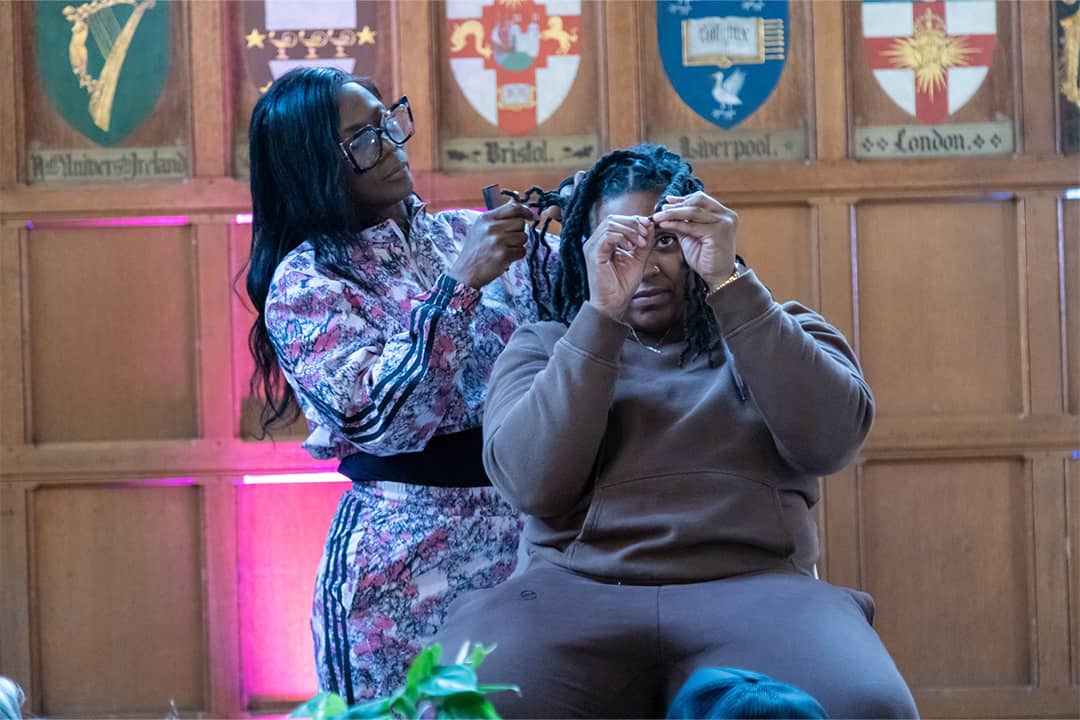On March 25, I attended the Hart House Barbershop operated by the Black Futures program — a programming series offered by Hart House meant to create “open dialogue and spaces for Black individuals to heal and thrive,” according to Hart House’s website.
The monthly Barbershop appears to have started as part of the Black Hair Fair during orientation week at U of T in 2022. It provides services for aAfro-textured hair including hair or beard trims, fades, hair-line or beard line-ups, and braiding services. The program is completely free of charge.
The setup: Lacklustre Black spaces on campus
Many know Canada as the end of the US’ Underground Railway, with a narrative that Canada marked the ‘Promised Land’ for Black people while it was running — although slavery also existed in Canada. Black people have a long history in Toronto and make up 9.6 per cent of people in the city, according to the 2021 Toronto census.
U of T does not currently publicly report on how many of its students are Black. However, multiple articles published in The Varsity by Black students discuss the lack of other Black students on campus.
According to the 2022 employment equity census, nearly seven per cent of U of T faculty identified as Black. This lack of representation manifests in the lack of Black barbershops, salons, and beauty stores around or close to the University of Toronto. Most of them are a distance away from the campus — for instance, the Curl Lounge at 623 Kingston Road and Crown and Glory at 32 Berwick Avenue.
Many still see Black hair as unprofessional. As Doyin Adeyemi wrote in her article earlier this year, “Although no explicit standard has told me to do so, I know there are ‘safe’ hair choices that make certain spaces easier.” It is a conversation that almost all aAfro-textured-haired people have to have with themselves: how do I style my hair when I go into certain spaces and how will the other people in these spaces — where I will be a minority — perceive me and my hair?
However, the creation of the Barbershop has led Black students to not only garner hair services that they previously had trouble finding on campus but also to gain a sense of community which some say they lacked before.
Creating the barbershop
Zoe Dille, manager of learning and community at Hart House, told me that Hart House created the event to foster a space for Black and racialized students, to attract Black male students to academic spaces who may be disengaged and underrepresented in them.
When asked if she was happy with the program, Dille noted that Hart House conducted a survey on the event. The survey found that the Barbershop serves as the primary social hub for many Black students on campus, facilitating their engagement with one another. She says this was the ultimate goal: to get folks to know they belong.
Music flooded through the open doors of the Committee Room on the second floor of Hart House when I arrived. The room was small but filled with a handful of students, predominantly Black students. In the one barber chair sat Elijah Gyansa — a fourth-year majoring in global health and immunology and a two-year frequenter of the Barbershop — who was getting his bi-weekly trim when I walked in.
“It’s amazing to come here and have somebody that looks like me taking care of my hair and understanding it,” said Gyansa. “It creates a natural space for students to come together without any barriers.”
He said that the lack of barriers opens up the conversation where the students can talk about the hardships they have faced. He said that the Barbershop, along with other such programs and events, “is vital for Black students because it creates a sense of belonging” and that, “without this, I wouldn’t have made as many friends.”
My last question for Gyansa asked about his experiences as a Black student with Aafro-textured hair on campus. “I think my academic career has been unfortunately similar to other Black students. It is hard to move forward when people do not look like you — you feel the need to exceed expectations… Unfortunately, sometimes we [only] see Black students in arts or sports. But we’re more than that. We exist outside of that.”
The barbershop will start up again in the next academic school year.
Editor’s note (April 17): This article has been updated to reflect that The Varsity interviewed Zoe Dille, not Janine Raftopoulos. The Varsity regrets this error.



No comments to display.